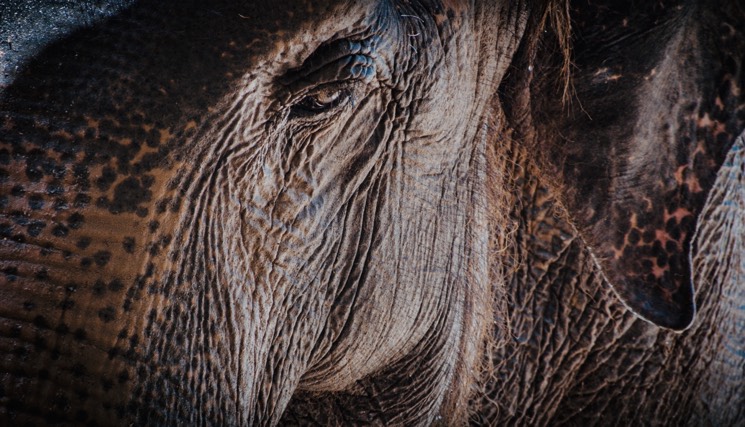
By
Erin Coulehan
Photography by
Alfonso Loya and the El Paso Zoological Society
The medical team worked gracefully as ballerinas to ensure the patient survived.
Doctors and their assistants conducted tests and x-rays that were run back and forth between the operating room and laboratory, while the anesthesiologist watched the clock and oxygen levels – ever mindful of the risks associated with the patient being under for an extensive period of time. The surgery wouldn’t be successful if the patient failed to wake up following the procedure.
Someone brought in a circular saw, the best instrument to file down the tooth of a hungry elephant in pain.
For Savannah the Asian elephant, the surgery was necessary because she couldn’t eat; an overgrown tooth had been piercing her inner mouth and she was not a happy elephant.
Imagine, a multi-ton animal who is hangry?
Luckily, the surgery was a success.
Savannah woke atop a soft bed of mattresses, arose to cheers from the medical team, and was able to eat again.
“The whole experience was testimony to the kind of care that animals receive in accredited zoos,” says Renee Neuert, Executive Director of the El Paso Zoological Society. “To watch that whole procedure, with people from all over the world working together – on Savannah – to assist in her medical treatment was life changing for me.”
For Neuert, observing the synchronicity, compassion, and care that went into ensuring Savannah’s survival from surgery are factors that contributed to her passion for her job.
Savannah, as well as other Asian elephants who lived at the El Paso Zoo, like Mona and Juno, are larger-than-life figures who have contributed to the core memories and lifestyles of many El Pasoans for generations. From field trips and family visits, to community events and education, a trip to the El Paso Zoo has always garnered interest in the elephants.
Savannah was the world’s oldest Asian elephant in managed care, a remarkable achievement for a creature of her size. Following Savannah’s death in early 2024, the El Paso Zoological Society is now working to determine the best way to commemorate El Paso’s elephants.
“They really are icons,” says Neuert. “A lot of people go see the elephants first when they visit a zoo. They’re so large, they’re so intelligent, and they’re so interesting to watch.”
Neuert explains that the Association of Zoos and Aquariums (AZA) has been conducting research on elephant conservation that includes providing guidelines for AZA-accredited facilities – like the El Paso Zoo – to abide by in order to ensure the health and well-being of the animals. The AZA manages close to 500 animal programs that are responsible for developing, implementing, and supporting animal management, science, and conservation dedicated to elephants.
According to the AZA, “Zoos have a unique opportunity to advance scientific knowledge of elephants by studying the health, nutrition, welfare, general physiology, behavior, and reproduction of the animals in their care. This knowledge can also be applied to elephant conservation and management in the wild. AZA-accredited zoos also promote elephant conservation by educating people about the threats elephants face in the wild and inspiring them to take action on their behalf.”
Neueurt explains the AZA’s mindfulness of the mental health of animals like elephants, as well as another stipulation that says living in a herd is optimal for their health.
“What this means is that we can’t have elephants by themselves and they have to have a lot of space,” says Neuert. “Elephants are very social, and the best scenario would be a grandma, a mom, dad, and a baby.”
Neuert says the El Paso Zoo will not have elephants again because the facilities do not have the space to support the needs of a herd according to the AZA stipulations.
“It’s sad but it really is for the mental health and welfare of the elephants,” she says. “It’s better for them in the long run, and you’ll still be able to see them at larger zoos.”
Honoring the legacy of Savannah, the 71-year old Asian elephant who lived at the El Paso Zoo since 1997, involves recognizing her many significant contributions to conservation, advocating for the welfare of elephants, and fostering a deeper understanding of the interconnectedness between humans and wildlife. In doing so, the El Paso Zoological Society hopes that continued efforts to protect endangered species and preserve biodiversity for future generations will be inspired.
“Savannah loved the individual attention she received while she was with us, the individual care and quality time with the keepers she loved so much and who loved her so much,” says Olivia Siqueiros, Events and Social Media Manager at the El Paso Zoological Society. “She knew she was the star and loved the attention.”
Born in 1953, Savannah journeyed through life with dignity, resilience, and charm, and left an indelible mark on the community and all who had the privilege of knowing her. Her presence at the El Paso Zoo was not only a source of wonder for visitors, but also a symbol of the El Paso Zoological Society’s commitment to conservation and the welfare of creatures great and small.
Throughout her years, Savannah delighted countless visitors with her majestic presence, serene demeanor, playful antics, and love of the spotlight. Her gentle nature endeared her to zookeepers and visitors alike, fostering a deep bond that transcended mere observation by creating relationships.
“The way we honor Savannah is by taking a look at the positive impact we can have for wildlife on this planet because they really need us now more than ever,” says Siqueiros.
The relationship between people and Asian elephants in the wild spans millennia and is characterized by a rich tapestry of cultural, ecological, and socioeconomic dynamics as both species navigate the challenges of coexistence within an ever-changing landscape. Conservationists agree that providing educational opportunities, as well as fostering mutual respect, understanding, and cooperation is essential to ensure the survival of the magnificent creatures and the ecosystems they inhabit.
Throughout history, Asian elephants have held a revered status across a multitude of societies, serving as symbols of strength, wisdom, and spiritual significance.
“Savannah was the first animal I met at the El Paso Zoo, way back when I was a volunteer more than 10 years ago,” says Siqueiros. “It sounds so cliche, but because of her eyes, her soul, and her spirit, I knew I was in the right place when I met her. Like, this is where I’m supposed to be. Savannah did that for a lot of people.”
In El Paso, most will agree that some of Savannah’s most charming character traits were her lust for life and appetite for everything.
“She LOVED food,” explains Neuert, “she loved all foods and fruits but one time she was given an onion. She put the whole thing in her mouth and was chewing on it, then a tear came out of her eye,” she laughs.
Among Savannah’s favorite foods were watermelons and pumpkins tossed to her that she would smash with a stomp of her great foot; donuts delivered by the dozen for special occasions like her birthday; and oranges.
Savannah LOVED oranges.
“She would squeeze the oranges given to her by her keepers, all the juice would run down her trunk and onto the floor,” says Siqueiros. “Then, with her trunk, she would rub some of the orange juice onto her ankles – like a perfume! She was a true queen.”
To honor Savannah’s legacy, Neuert and Siqueiros agree that contributing to conservation and education are a great place to start.
“Sometimes people think that to support wildlife, you have to go to places like Indonesia or Africa,” explains Siqueiros of the common misconception, “but there are ways to help at home by supporting the local zoo and other organization that advocate for the education and promotion of the value of wildlife makes a big impact.”















